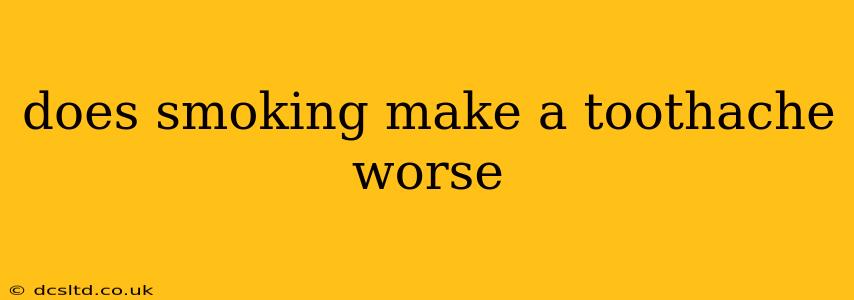A toothache is excruciating, and anything that exacerbates the pain is unwelcome news. Many people wonder if smoking worsens toothaches, and the answer, unfortunately, is a resounding yes. Smoking significantly impacts oral health, creating an environment that can intensify tooth pain and hinder healing. Let's delve into the specific ways smoking interacts with a toothache.
How Does Smoking Aggravate Toothaches?
Smoking doesn't directly cause a toothache, but it dramatically worsens existing dental problems and can make recovery more difficult. Here's how:
-
Reduced Blood Flow: Nicotine constricts blood vessels, limiting blood flow throughout the body, including the mouth. This reduced blood flow hinders the delivery of oxygen and nutrients necessary for healing damaged tissues, slowing down the natural recovery process of a toothache. Less blood flow means the body's natural pain-fighting mechanisms are less effective.
-
Impaired Immune Response: Smoking weakens the immune system, making you more susceptible to infections. If your toothache stems from an infection like an abscess, smoking can prolong and worsen the infection, leading to increased pain and potential complications.
-
Dry Mouth (Xerostomia): Smoking significantly reduces saliva production. Saliva plays a crucial role in neutralizing acids, washing away food particles, and lubricating the mouth. A dry mouth created by smoking allows harmful bacteria to thrive, further irritating inflamed tissues and intensifying tooth pain.
-
Increased Sensitivity: Smoking can increase the sensitivity of your teeth and gums. This means even mild stimuli like cold or hot drinks can cause significantly more pain when you already have a toothache.
-
Delayed Healing: As mentioned earlier, the reduced blood flow and weakened immune system contribute to slower healing times. This means your toothache could persist for a longer duration compared to a non-smoker experiencing the same issue.
-
Increased Risk of Gum Disease (Periodontitis): Smoking is a major risk factor for periodontal disease, which causes inflammation and infection of the gums and tissues supporting the teeth. Periodontitis can lead to loose teeth, bone loss, and severe pain, directly worsening a pre-existing toothache or contributing to new ones.
Can Quitting Smoking Help My Toothache?
Absolutely! Quitting smoking is one of the most significant things you can do to improve your oral health and alleviate the pain associated with a toothache. Quitting will improve blood flow, boost your immune system, and reduce dry mouth, all contributing to faster healing and reduced pain. While quitting won't magically cure your toothache, it will significantly improve your body's ability to heal and reduce the likelihood of future dental problems.
What Other Factors Can Worsen Toothaches?
Several other factors can worsen toothaches alongside smoking:
-
Underlying Medical Conditions: Certain medical conditions can influence the intensity of pain.
-
Stress: Stress can exacerbate pain perception, making a toothache feel worse than it actually is.
-
Medication Side Effects: Some medications list dry mouth as a side effect, mimicking the effects of smoking and potentially increasing pain.
-
Ignoring the Problem: Delaying dental treatment can lead to worsening infections and more severe pain.
When Should I See a Dentist?
If you have a toothache, it's crucial to seek professional dental care as soon as possible. Don't delay treatment, especially if the pain is severe, persistent, or accompanied by swelling, fever, or other concerning symptoms. A dentist can diagnose the cause of your toothache and recommend the appropriate treatment, providing much-needed relief.
Conclusion: Smoking and Toothaches – A Harmful Combination
In conclusion, smoking significantly exacerbates toothaches. The impact on blood flow, immune response, and saliva production creates an environment where pain is intensified, and healing is delayed. Quitting smoking is a crucial step towards improving oral health and managing tooth pain effectively. Remember to consult a dentist promptly for any toothache to receive appropriate diagnosis and treatment.
